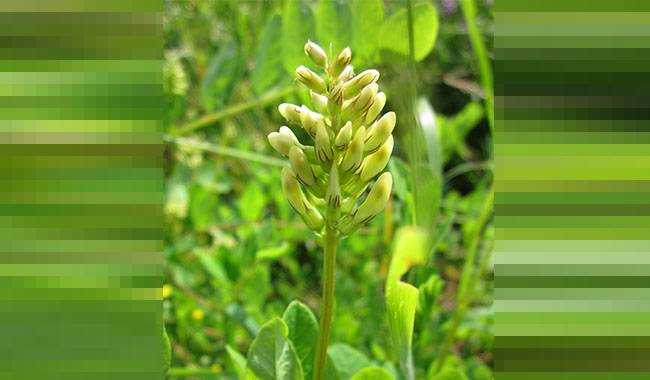
Astragalus is a well-deservedly forgotten medicinal plant that is easy to grow in flower beds. Today there are many types of astragalus, but in this article, we will talk about the woolly, or fluffy, astragalus that is recognized by the official pharmacopeia as a healing plant.
By the way, according to one version, the Astragalus herb helped humans to live to high age and feel better.
We will tell you about the medicinal properties of the plant and the peculiarities of its cultivation in the article.
BOTANICAL DESCRIPTION
Astragalus (Huáng Qí) is commonly known as Astragalus propinquus, Milkvetch, etc. Astragalus is a nitrogen-fixing perennial that contributes to the nitrogen enrichment of the soil.
The plant does not exceed 14-16inch (35-40 cm) in height. The numerous stems are reddish, more brownish-gray, hairy because of pubescence, and can be recumbent, ascending, or erect. The leaves of Astragalus are compound petioles with up to 12-14 subsessile, opposite, softly hairy paired leaves on a central elongated petiole.
The inflorescence of the Astragalus is dense and moderately dense, with 15-20 yellow flowers at the tip of the pedicel. Because all terrestrial organs (except the corolla) are densely pubescent with short white hairs, the plant appears to be covered with delicate cobwebs or felts.
The flowers of Astragalus are moth-like and their structure is characteristic of the legume family. The flowering period is from late May to late July. The odor is grassy and light, and the taste is sweet. The fruit is oval or elliptical pea-shaped and ripens in July-August. The seeds are yellow-green and triangular in shape.
MEDICINAL PROPERTIES OF ASTRAGALUS FLOWERS
The medicinal properties of Astragalus (according to the literature) were first noted and used by the Scythians. They called this plant the royal or immortal herb.
But even today it is believed that the medicinal plant Astragalus rejuvenates the body, eliminates age-related disabilities, has a significant effect on fatigue, physical stress, increases vitality, and thus prolongs life.
Thanks to the unique combination of chemical components, official medicine has developed a number of drugs based on Astragalus for the treatment of the cardiovascular system and blood clotting.
The content of isoflavones inhibits the development of tumors and the increased content of selenium has a positive effect on the body as a whole. Today modern medicine pays special attention to all plants that contain selenium. It is no secret that the lack of selenium in organs and tissues significantly reduces the body’s resistance to cardiovascular diseases and cancer. So, in the amount of selenium astragalus – one of the record-breakers among medicinal plants!
Infusions and decoctions of the Astragalus are used in diseases of the kidneys and liver, as a sedative, to lower blood pressure, to dilate coronary vessels, etc. Today, you can easily buy astragalus in pharmacies.
Preparations based on the hairy flowers of the Astragalus are also used for cosmetic purposes: they smooth wrinkles, give elasticity to the skin, relieve boils, pustules, and pus-filled abscesses.
Preparation and use of astragalus soup and tincture of astragalus
In folk medicine, Astragalus is an almost universal remedy. Experienced herbalists harvest the “elixir of immortality” every year and prepare decoctions and infusions (water and alcohol) when necessary.
Always consult a doctor before taking independently prepared astragalus medicines.
They are used for gargling in throat diseases (pharyngitis, stomatitis, periodontal disease, etc.), rheumatism (joints), traumatic burns, expectorants, and scrofula (drinking).
Astragalus has a good diuretic effect on chronic cystitis, pyelonephritis, urolithiasis. Astragalus decoction is considered by folk healers to be the first medicine for diseases of the central nervous system and gastrointestinal tract.
If you take regular infusions and decoction with Astragalus (4-5 weeks, then break about the same amount and repeat the course) disappears or significantly reduces pain in the heart, swelling goes, heart rate evens out and, in general, feels significantly better.
ASTRAGALUS HERBAL INFUSION TABLETS
Add 2 tablespoons of crushed herbs (about 20 grams) to each cup of boiling water (200 ml). Brew for half an hour, or take a water bath for 15 minutes, cool, and strain. Infuse to 200 ml. Drink 3 times a day, 50 ml each time, or gargle 3 – 5 times.
Chinese herbal decoction Astragalus
Pour 2 tablespoons of dry ingredients (20 g) into boiling 200 ml of water, close the container with a lid and turn off the heat. Hold until completely cooled. Strain. Take 2 tablespoons 3 times a day (after meals).
Alcohol infusion of astragalus
Pour 1 part of dry ingredients into 3 parts of alcohol or good quality vodka. Cover tightly and shake regularly for 2 weeks. This solution is filtered and covered.
Take 25-30 drops 3 times daily before meals.
GROWTH CHARACTERISTICS OF ASTRAGALUS
Astragalus prefers sunlight and is drought tolerant, but needs watering when grown in southern areas. It grows in open areas where shade and too frequent watering can cause the plant to die.
Astragalus is becoming less and less common in nature, so the culture is being actively introduced in countries around the world.
Astragalus does not require a lot of soil. However, clay soil is not desirable. It does not grow in acidic and saline lands.
Soil is replanted from autumn so that 1 square meter area is fertilized by 20-30 grams of nitro-ammonia-phosphorus-potassium or other full amounts. On poor soils, add 2-4 kg of manure (well-rotted or semi-rotted). Plots are leveled.
Harrow the soil with a hand harrow or rake before sowing in spring astragalus. In the second and subsequent years of cultivation, apply a sufficient base fertilizer in the spring when the regrowth mass begins to grow, at a rate of 10-20 grams per 1 square meter area, preferably with watering.
Astragalus seeds should be scarified before planting, which can be done with sandpaper. For better germination, they should also be soaked for a few hours.
Sow the seeds in a row or in separate wells in late March to April at a depth of 0.8-1.2inch (2-3 cm). Place 10-20 seeds per running table. The distance between rows is 16-18inch (40-45 cm).
Sprouting of astragalus appeared after 2 weeks. During the first 2 months, the plants develop very slowly and require careful care (weed elimination, feeding, watering). germination occurs after 1-1.5 months and flowering lasts for more than a month. During the budding and flowering period, the procurement of medicinal ingredients is initiated.
The above-ground parts of Astragalus die off in late autumn each year. The roots and renewal buds overwinter.
Astragalus is affected by pests and diseases, but since it is a medicinal plant, it can only be protected by biological agents: against fungal and bacterial diseases: against pests insecticides”, etc.
PREPARATION OF MEDICINAL RAW MATERIALS
The preparation of raw materials begins in the first year of Astragalus at the time of massive budding and first flowering. Some plants leave seeds in 2-3 years of vegetation.
Grass astragalus is cut in the morning until 11:00 am in dry weather. The grass is cut at a height of 2-3inch (5-7 cm) from the soil.
Clean the collected mass of foreign impurities and place a layer of absorbent material (paper, natural fabrics) no more than 3inch (7 cm) above the soil. Do not allow the raw material to overheat and do not allow direct sunlight on the grass.
Dry astragalus in a well-ventilated room or in a dryer with a temperature not exceeding 122°F (50°C). The end of drying is determined by the brittleness of the stem and leaf petioles.
Preserve the medicinal properties of dried astragalus by storing it in a natural cloth bag or small loose hanging bag in a dry room for two years.



